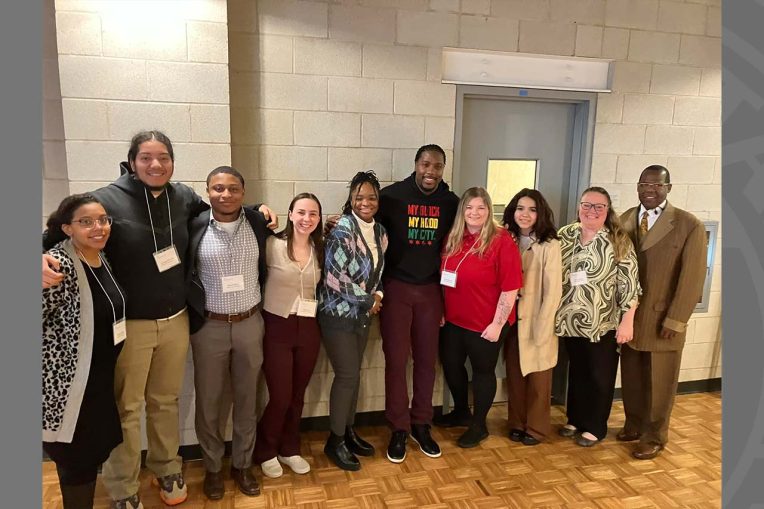Recently, CAST Connections and CJS Leads collaborated to send a group of students to the College Leadership Summit at the Illinois Holocaust Museum. CAST Connections is the College of Applied Science and Technology’s student success center, and CJS Leads is a leadership program within the Department of Criminal Justice Sciences (CJS).
“CJS Leads is a departmental leadership program for sophomores in the program,” said Tracy Hanson, academic advisor for CJS. “To become a member of CJS Leads, a student must have attended a Rising Sophomore session second semester freshmen year. The Rising Sophomore program is intended to be a transition program directed toward rising sophomores (second semester, first-time in college students) who are criminal justice sciences majors.
“The purpose of the program is to connect CJS rising sophomores with academic and internship support and to identify high impact activities, bridging the gap between exploration and student academic engagement. CJS Leads is the next step. This program focuses on leadership building, career development, and civic engagement.”
Gianna Bottom is a senior in CJS and an alumna of the CJS Leads program.
“I chose to participate in CJS Leads because it gave me opportunities to network with peers and others in the criminal justice field while teaching me how to be a better leader,” Bottom said.
Darrell Hill, a sophomore CJS student, was looking to join a registered student organization (RSO) and more.
“I chose to participate in CJS Leads because of the amazing leadership enrichment. Furthermore, I wanted to join my first RSO and be involved on campus,” Hill said.
“Since CJS Leads is comprised of students interested in leadership, we knew that they would benefit from the experience of attending this leadership summit,” said Tamekia Bailey, director of CAST Connections. “It was a natural partnership opportunity.”
“The summit focused on how leaders can find ways to make an impact on their communities through awareness, active listening skills, understanding of history, and tips to follow when taking on an initiative in their community,” said Hanson.
“There were breakout sessions on topics such as genocide, the four I’s of oppression, and taking a stand on value-centered beliefs,” said Dewhitt Bingham, clinical assistant professor in CJS. “There was a presentation on a Holocaust survivor, a virtual reality of a Holocaust survivor, and an exhibit of The Green Book.” Additional speakers included leadership coaches, members of the Peace Corps, and CEOs of social change organizations.
“The most influential display I saw was The Green Book display,” Hill said. “The Green Book was a guide that Black Americans used during the post-Civil War, Jim Crow era that protected families and provided them with services. The display at the Illinois Holocaust Museum was a great addition that offered interactive videos. Experiencing this exhibit expanded my knowledge tremendously.”
“I really believe that good race relations are very important to this dispensation, and that might have been the biggest takeaway … knowing who is in the room and how to make things better for all groups of people,” Bingham said.
“This conference taught me how to advocate for social issues and be a leader within that process,” Bottom said. “It taught me it is OK to be vulnerable within leadership and to use that vulnerability to motivate myself and those around me.”
“I believe that the biggest takeaway for our students was hearing firsthand that activist work is hard and what that can look like,” Hanson said. “But it also demonstrated how rewarding it is to be able to support those around you who need it. It’s important for them to know that they can start small and grow from there in their initiatives, and that they need to know their community partners and tap into them when creating an initiative to help their community.”
“Outings like this not only increase our students’ knowledge, but they improve their communication, diversity, and problem-solving skills,” Bingham said. “It was so much fun to go as a group like this.”
“Out of classroom activities are crucial for student growth, personally, emotionally, and professionally,” Hanson said. “It is one thing to read and discuss a topic in a classroom and another to see it in action.”
“Students should absolutely participate in activities like these outside of the classroom because it gives you connections and experiences that just can’t be achieved inside a classroom,” Bottom said. “It is an experience that can’t be replicated in course materials.”
“School isn’t limited to one fixed location,” Hill said. “We learn everywhere we go, and I’m so grateful for stepping into the unknown and participating in this leadership summit.”

